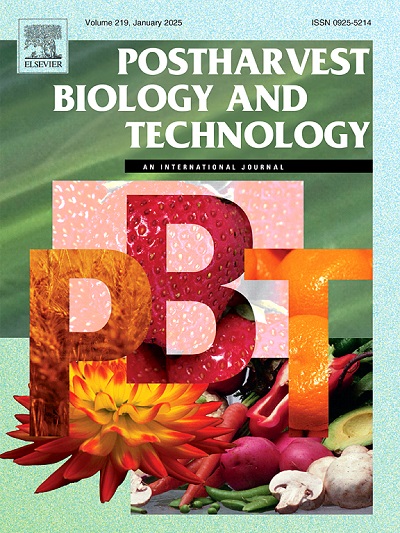Gene co-expression network analysis of the transcriptome identifies cold-resistant hub genes related to carbohydrate metabolism in peach fruit
IF 6.4
1区 农林科学
Q1 AGRONOMY
引用次数: 0
Abstract
In order to explore the key factors involved in the regulation of chilling injury formation in carbohydrate metabolism of peach fruit, we systematically analyzed the response of peach fruit to cold stress from physiological and transcriptomic perspectives. Cold stress in peach elevated malondialdehyde, impaired membranes, reduced sucrose via invertase-mediated hydrolysis to fructose/glucose, and may activate pentose phosphate pathway while inhibiting glycolysis pathways for metabolic maintenance and energy conservation, as suggested by phosphofructokinase and glucose-6-phosphate dehydrogenase activity shifts. Transcriptome and weighted gene co-expression network analysis revealed a series of genes respond to low-temperature stress in starch and sucrose metabolism pathway, including vacuolar invertases gene (PpVIN), hexokinase gene (PpHXK), trehalose-phosphate synthase gene (PpTPS), trehalose-phosphate phosphatase gene (PpTPP), and fructokinase gene (PpFRK), of these hub genes have been reported to resist to cold stress. In addition, by constructing co-expression network, several transcription factors (TFs) were involved in regulating hub genes related to carbohydrate metabolism in peach fruit, such as ZAT12, bZIP23, bZIP53, CBF5, and others. These TFs may serve as key regulators of the transcriptional network, modulating gene expression related to carbohydrate metabolism in response to cold stress.
转录组的基因共表达网络分析确定了与桃果碳水化合物代谢有关的抗寒枢纽基因
为了探索调控桃果碳水化合物代谢中寒害形成的关键因素,我们从生理和转录组学角度系统分析了桃果对冷胁迫的响应。正如磷酸果糖激酶和葡萄糖-6-磷酸脱氢酶活性变化所表明的那样,水蜜桃的冷胁迫会升高丙二醛、损害细胞膜、通过转化酶介导的果糖/葡萄糖水解减少蔗糖,并可能激活磷酸戊糖途径,同时抑制糖酵解途径以维持新陈代谢和节约能量。转录组和加权基因共表达网络分析揭示了淀粉和蔗糖代谢途径中一系列基因对低温胁迫的响应,包括液泡转化酶基因(PpVIN)、己糖激酶基因(PpHXK)、三卤糖磷酸合成酶基因(PpTPS)、三卤糖磷酸磷酸酶基因(PpTPP)和果糖激酶基因(PpFRK),其中这些枢纽基因已被报道能抵抗低温胁迫。此外,通过构建共表达网络,一些转录因子(TFs)参与了对桃果碳水化合物代谢相关枢纽基因的调控,如ZAT12、bZIP23、bZIP53、CBF5等。这些转录因子可能是转录网络的关键调控因子,在应对冷胁迫时调控与碳水化合物代谢相关的基因表达。
本文章由计算机程序翻译,如有差异,请以英文原文为准。
求助全文
约1分钟内获得全文
求助全文
来源期刊

Postharvest Biology and Technology
农林科学-农艺学
CiteScore
12.00
自引率
11.40%
发文量
309
审稿时长
38 days
期刊介绍:
The journal is devoted exclusively to the publication of original papers, review articles and frontiers articles on biological and technological postharvest research. This includes the areas of postharvest storage, treatments and underpinning mechanisms, quality evaluation, packaging, handling and distribution of fresh horticultural crops including fruit, vegetables, flowers and nuts, but excluding grains, seeds and forages.
Papers reporting novel insights from fundamental and interdisciplinary research will be particularly encouraged. These disciplines include systems biology, bioinformatics, entomology, plant physiology, plant pathology, (bio)chemistry, engineering, modelling, and technologies for nondestructive testing.
Manuscripts on fresh food crops that will be further processed after postharvest storage, or on food processes beyond refrigeration, packaging and minimal processing will not be considered.
 求助内容:
求助内容: 应助结果提醒方式:
应助结果提醒方式:


